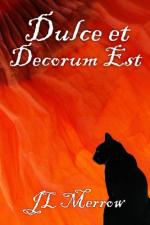|
This section contains 480 words (approx. 2 pages at 300 words per page) |

|
Grotesqueness of War in "Dulce et Decorum Est"
Summary: Grotesqueness of war in "Dulce et Decorum Est" by Wilfred Owen.
Through the use of imagery and figurative language Wilfred Owen in "Dulce et Decorum Est" paints a grotesque picture of war. Owen uses many figurative devices to convey his feelings towards war. He begins the poem by using two similes. These similes both convey the same idea, that the solfiers have turned prematurally old. "Bent double, like old beggars," and "caughing like hags,: show that the soldiers, probobly less than 25 years of age, have been pir thorogh such terrible situations that theor bodies have ages very quickly. While this simile shows a true representation of war, a simile in the second stanza uses a more grotesque image. "flound'ring like a man in fire or lime." This is It is in this stanza that Owen begins to truly show the harsh conditions that these soldiers are forced to endure. An even more haunting simile appears in the third stanza...
|
This section contains 480 words (approx. 2 pages at 300 words per page) |

|


